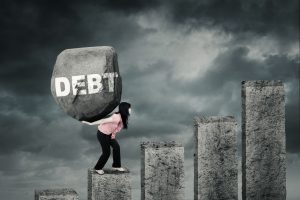How Can You File for Bankruptcy in New York if You Can’t Afford to Pay a Bankruptcy Lawyer?
Chapter 7 bankruptcy is the most common type of personal bankruptcy and is used to wipe out most types of debts (with certain exceptions). But, what do you do when you have serious creditor problems, such as collection calls, collection lawsuits, and/or wage garnishments, but can’t afford to file a chapter 7 bankruptcy?

Do you end up like the person in the image above struggling to try to carry a huge debt burden with no end in sight? Thankfully, there is a solution. As pointed out in an interesting article that appeared in ProPublica by Paul Kiel, a challenge people face is they want to file bankruptcy but lack money to hire a bankruptcy attorney. The article points out that in the southern part of U.S. more people file 13 bankruptcy than in other parts of the country because in chapter 13 bankruptcy they can pay the bankruptcy attorneys’ fees off over time out of their earnings.
Chapter 13 bankruptcy has been covered in previous blog posts here. At Starr & Starr, PLLC we typically use chapter 13 bankruptcy to help people in New York City (Manhattan, Bronx, Queens, Brooklyn and Staten Island), Westchester, Nassau and Suffolk Counties save their homes, catch up on back rent, and/or catch up with car payments. However, we have some clients who want and need to file bankruptcy but don’t have enough money to pay the fees and costs associated with a Chapter 7 bankruptcy, even if we give them a pre-filing installment plan with payments over time. For those clients chapter 13 bankruptcy can be a way to allow them to file now and pay the attorneys’ fees over time out of their earnings through their chapter 13 plan. This can be particularly useful for clients whose bank accounts are frozen or have a pending wage garnishment (which stops once the bankruptcy is filed).
 New York Bankruptcy Lawyer Blog
New York Bankruptcy Lawyer Blog

